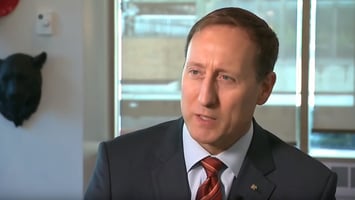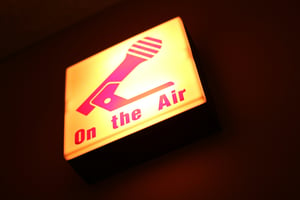You have seen interviews where the spokesperson has brought proceedings to an abrupt end when they...
When a spokesperson is caught out by a tricky question in a media interview people will often say that they ‘should have expected the unexpected’.
But how exactly can you prepare for something that can’t be, or hasn’t been anticipated?
Well, you can narrow down the possibilities in your preparation and by understanding why these unexpected curve ball questions are asked.
When can you expect the unexpected?
On our media training courses we explain that the unexpected question typically comes at the end of an interview. The spokesperson thinks the interview is going well and that it is coming to an end and then they are asked a question that begins along the lines of ‘while you are here’ or ‘while I’ve got you’.
And this question often has nothing to do with what you have arranged to talk about. So, it is important to always be on guard for that zinger.
But occasionally, it might also be asked at the start of the interview. Eddie Mair, who now works for LBC, has a tendency to ask something fairly obscure as his opening question. For example, a recent interview with Cabinet Minister Liz Truss began with the question, “how have you personally been affected by austerity?”, which she clearly wasn’t expecting and struggled to answer.
Why are unexpected questions asked?
Get a reaction
Unexpected question can raise the pressure in an interview and that can make for compelling viewing – crucial when you are trying to attract viewers and listeners to your programme in a competitive media age.
And some journalists simply enjoy being provocative.
The problem for spokespeople is that taking the bait and giving a reaction will become the focus of the story.
Looking for a story
Sometimes a journalist will look to move the conversation to other areas because they don’t believe the spokesperson has given them a story.
They are still looking for that unusual angle, that human element and something that is relevant to their audience.
So, one way to reduce your chances of this happening is to make sure you have something to say in an interview. Tell the journalist and their audience something they don’t know.
A great example of a spokesperson coming unstuck because he had little of value to offer during an interview came a few years ago when Cadbury’s North American President Brad Irwin appeared on CNBC.
After a series of bland answers, which avoided the questions that were being asked, one of the frustrated presenters said: “You just offer great products at reasonable prices that taste really good – you don’t have any comments on anything happening in the industry. Can we ask you about competitors or will we not get an answer there either?”
Eventually the questions became more obscure, covering things like sugar cartels.
Journalists will play Devil’s Advocate
If a spokesperson or their organisation has particularly strong opinions, it is likely opposing viewpoints will be put to them.
They will play Devil’s Advocate.
BBC journalist Andrew Neil took to Twitter earlier this year after a particularly stormy interview to say that he tends to 'take the opposite position' from the people he interviews to 'test their position'.
And that means the interview could take an unexpected turn.
Robotic
If a spokesperson is sounding robotic and overly rehearsed a journalist might be tempted to change the subject and move the conversation on to an area where they may be less assured.
How can spokespeople reduce their chances of being asked an unexpected question?
As we mentioned earlier, one way is to give journalists a good story which ticks all the newsworthy boxes.
But it is also important to spend time anticipating what the unexpected issues could be. If your organisation had a period of negative coverage a few months ago that could be brought in to the interview. Similarly, the CEO’s pay, if it has attracted controversy in the past, could become a line of questioning. Or it could be a wider sector issue or even a political angle like Brexit.
There’s no guarantee that you will anticipate the right question, or even the right topic, but this type of preparation, and knowing how you will answer these questions, will reduce the odds.
How should unexpected questions be handled?
Bridge
You don’t want to be seen to be trying to dodge a question no matter how unexpected it might be. So, the bridging technique we teach in our media training courses is key.
Use it to briefly answer, or at least acknowledge the question, and then look to steer the conversation back to what you want to talk about.
When it is used well, it sounds natural and is difficult for audiences to detect.
14 bridging phrases for your next interview
Composure
It is crucial that spokespeople don’t sound rattled or show frustration when they find themselves facing a question they have not anticipated.
Easier said than done maybe, but any hint of anger or annoyance will be seen as unease and having something to hide. And it can become the focus of the story.
Buy yourself some thinking time
If you’ve been caught off-guard by an unexpected question, buy yourself some thinking time.
A brief pause or a phrase like ‘that’s a good question’ – as long as it is used sparingly – can give you a few moments to gather your thoughts and plan how you are going to respond.
Don’t know
Of course, there will be times where no matter how much preparation you do, a question comes along that you haven’t anticipated and don’t know how to answer.
Spokespeople are often reluctant to say ‘I don’t know’ but it is a far better approach than getting drawn into discussing a topic you don’t really understand or speculating on something which may come back to haunt you. If you do use this phrase in a broadcast interview, go on to tell us what you do know. This will help to ensure you still sound helpful and cooperative. Additionally, just saying “I don’t know” on its own surrenders control to the journalist and is likely to lead to a barrage of questions.
If it is a print interview you can additionally offer to come back to the journalists with some more information on that question or put them in contact with someone who may be better placed to help.
Media First are media and communications training specialists with over 40 years of experience. We have a team of trainers, each with decades of experience working as journalists, presenters, communications coaches and media trainers.
Click here to find out more about our bespoke journalist-led media training courses.




